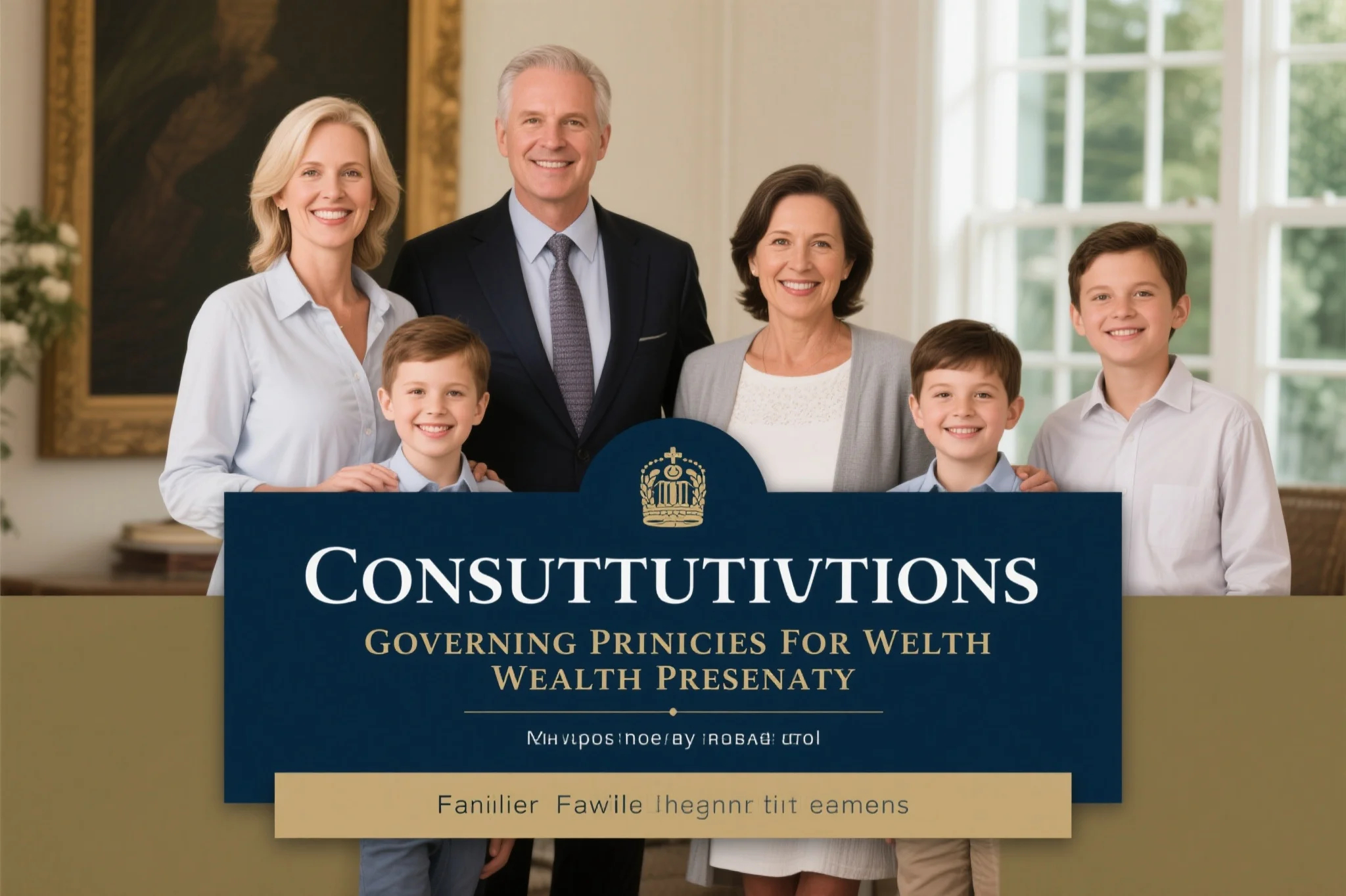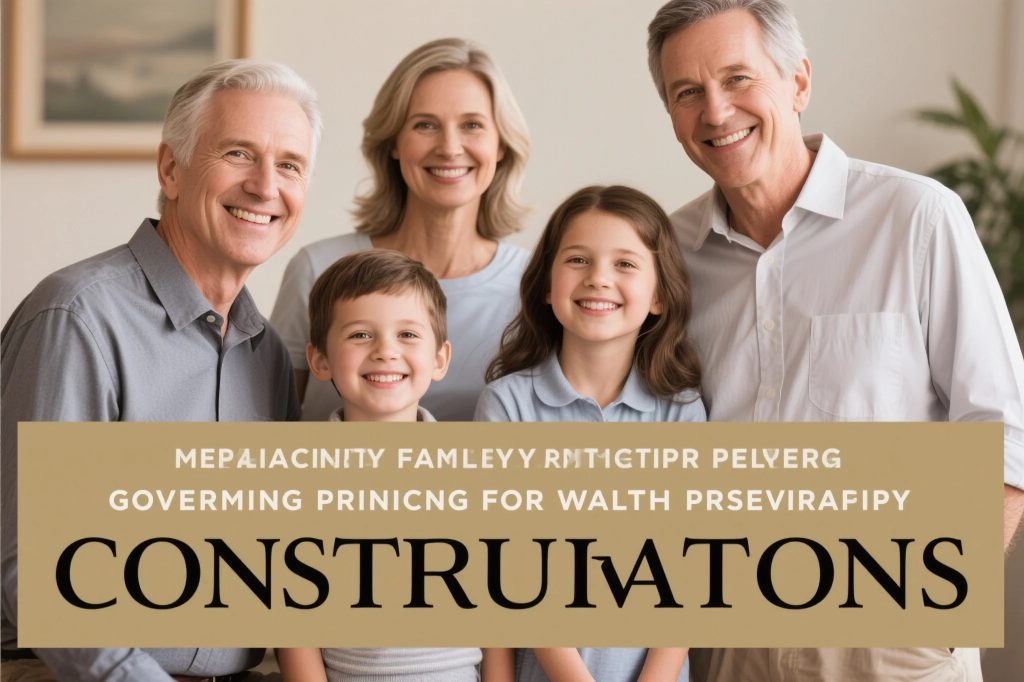
The Foundation of a Family Constitution
In the complex world of wealth management, especially for families with significant assets, establishing a family constitution is a critical step toward ensuring long-term stability and harmony. A family constitution is much more than a formal document—it is a living framework that codifies the core values, vision, and agreed-upon rules that govern family interactions and the stewardship of wealth. Its purpose is to create clarity around decision-making, conflict resolution, and the roles and responsibilities of family members, serving as a guiding beacon to preserve family wealth across generations.
For many high-net-worth families, the journey toward drafting a family constitution often begins with recognizing the need for a structured wealth preservation strategy that transcends mere asset management. The constitution formalizes the shared beliefs that hold the family together and provides mechanisms to address challenges before they escalate. This proactive approach helps mitigate misunderstandings and aligns family members on goals ranging from philanthropic commitments to investment philosophies. Importantly, it also fosters a culture of transparency and accountability, essential ingredients for sustained success and unity.
Building a family constitution is not a one-time event but rather an evolving process. It requires open dialogue, sometimes facilitated by professional advisors, to ensure all voices are heard and that the document reflects the true spirit of the family. This collaborative process strengthens bonds and nurtures a collective identity, preparing the family for the inevitable changes and transitions that come with wealth stewardship. Ultimately, the family constitution becomes a cornerstone of the family’s legacy, ensuring values endure even as wealth grows and spreads.
Crafting a Robust Governance Framework
Integral to the power of a family constitution is the establishment of a clear and effective governance framework. Governance in this context refers to the system of rules, practices, and processes by which the family’s wealth and related affairs are directed and controlled. Without a solid governance framework, families risk fragmentation, mismanagement, and conflicts that can erode both wealth and relationships.
A well-designed governance framework outlines how decisions are made, who has authority over various aspects of the family’s assets, and the protocols for resolving disputes. This can include the creation of family councils, advisory boards, and regular meetings to discuss financial and non-financial matters alike. By setting clear boundaries and responsibilities, the governance framework helps balance power among family members and prevents unilateral decisions that could jeopardize collective interests.
Moreover, the governance framework often integrates policies for educating younger generations, ensuring that successors are prepared for their roles as stewards of family wealth. Education initiatives might cover financial literacy, philanthropy, and the history of the family’s values and businesses. Through such structures, the family not only safeguards its assets but also nurtures a shared sense of responsibility and purpose. The governance framework embedded in a family constitution thus becomes the operational backbone that enables continuity and resilience in the face of internal and external challenges.
Integrating HNW Family Planning with Core Values
High-net-worth (HNW) families face unique complexities when it comes to wealth management, which makes intentional HNW family planning an indispensable practice. Integrating the practical aspects of managing and growing assets with a strong foundation of family constitution principles creates a powerful synergy that supports sustainable wealth accumulation and preservation.
HNW family planning extends beyond investment choices to encompass estate planning, tax strategies, succession planning, and philanthropy, all aligned with the family’s core values. It requires a comprehensive understanding of each family member’s goals, risk tolerance, and intergenerational expectations. The family constitution acts as a blueprint, ensuring that all planning efforts honor the family’s mission and ethical commitments.
In practice, this might involve formalizing agreements around how wealth is allocated among branches of the family, how new members can join decision-making processes, and how conflicts will be managed. It also means preparing the family for liquidity events, such as business sales or inheritances, with clear guidelines that prevent disputes and protect the family’s financial ecosystem. By integrating hnw family planning within the governance framework, families create a holistic approach to wealth stewardship that is as thoughtful as it is strategic.

Preserving Intergenerational Values Across Time
At the heart of every enduring family fortune is a shared commitment to intergenerational values. These values are the cultural DNA passed down from one generation to the next, shaping the way wealth is viewed, used, and protected. A family constitution codifies these values, ensuring that the family’s legacy is not just financial but deeply rooted in purpose and identity.
Preserving these values requires intentionality and education. Many families use retreats, workshops, and storytelling to pass on lessons and philosophies. This process helps younger generations understand the sacrifices and vision of their predecessors, fostering respect and responsibility toward the family’s wealth. Furthermore, by embedding these values in the governance documents, families create mechanisms to uphold their principles even as leadership changes.
Family constitutions also help address the evolving nature of values, allowing room for adaptation while maintaining core commitments. This balance between tradition and innovation is critical in a rapidly changing world where new social, economic, and environmental realities influence wealth management decisions. By focusing on intergenerational values, families ensure that their wealth remains a source of strength, identity, and purpose across multiple lifetimes.
Challenges and Solutions in Family Constitution Implementation
While the benefits of a family constitution are clear, many families encounter obstacles in creating and implementing one. Emotional dynamics, differing opinions, and generational divides can complicate the process, sometimes leading to resistance or fragmentation. Recognizing these challenges early and addressing them proactively is crucial for success.
Professional facilitation is often necessary to navigate sensitive discussions and to draft documents that reflect consensus. Neutral third parties, such as family business consultants, legal advisors, and wealth planners, bring expertise and objectivity, helping families focus on common goals rather than conflicts. Transparency and open communication are also vital in fostering trust and collaboration.
Another challenge is ensuring the family constitution remains relevant over time. As families grow and external conditions evolve, periodic reviews and updates are essential. Embedding revision protocols in the governance framework allows the document to adapt without losing its foundational integrity. This flexibility ensures that the family constitution continues to serve as an effective guide in the preservation of wealth and values, even amid change.
The Transformative Impact of a Family Constitution
Ultimately, a family constitution transforms how wealth is experienced and preserved. It shifts the focus from individual ownership to collective stewardship, emphasizing the importance of shared purpose and responsibility. Families that embrace this approach often find greater cohesion, reduced conflict, and enhanced capacity to face future challenges together.
Beyond the practical benefits, the constitution fosters a culture of intentionality, where each generation feels connected to a legacy much larger than personal gain. This cultural cohesion supports philanthropy, entrepreneurship, and innovation, all while safeguarding the family’s financial future. In this way, the governance framework and interwoven values become a living testament to the family’s enduring vision, a blueprint not only for preserving wealth but for enriching lives.
For families committed to long-term success and harmony, investing the time and resources into crafting a comprehensive family constitution is one of the most impactful decisions they can make. It sets the stage for lasting wealth preservation, empowered governance, and a vibrant legacy that transcends generations.